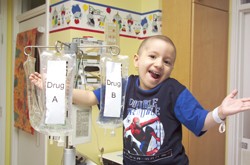In support of childhood cancer patients
The project ENCCA(opens in new window) (European network for cancer research in children and adolescents) has strengthened research and care in the field of paediatric oncology. The initiative helped integrate basic, epidemiological, preclinical and clinical research with implementation and evaluation of interventions targeting prevention, diagnosis, prognosis, treatment and care. Thirty-four organisations in 11 countries came together to ensure sustainable networking and research excellence in cancer. ENCCA members established nine advisory structures, which include key stakeholders from academia, industry and parent/patient associations. The full list is available on a dedicated ENCCA web page. With regard to policy, efforts have contributed to the new European Clinical Trial Regulation satisfying important needs of rare diseases, and paediatric haematology oncology (PHO) in particular. A cloud-based architecture solution – Advanced Biomedical Collaboration Domain 4 ENCCA – was developed for the European Virtual Institute. The project has also delivered a web-based communications and e-learning platform supporting clinical research in rare tumours. One of the participants in this area is SIOPEL(opens in new window), a group dedicated to improving the prognosis and quality of life of children with primary childhood liver tumours. ENCCA developed the survivorship passport tool for secondary prevention and improved quality of life for cancer patients. This is already an integral aspect of the Austrian National Cancer Plan. Other project achievements include a roadmap towards the federation of ENCCA biobanking resources, high-profile publications, and a database initiative leading to the establishment of an international consensus classification system for paediatric liver tumours. ENCCA has supported several relevant projects with groundbreaking research findings and high translational potential. They also established a consortium to sponsor clinical trials for molecularly targeted leukaemia therapy. In addition, a PHO platform was set up to promote drug discovery and development for paediatric cancer. These activities are benefiting childhood cancer patients as well as their families and carers even though the project has ended. The project has ensured long-term sustainability through the strategic European Cancer Plan for Children and Adolescents(opens in new window). This was presented at the European Cancer Congress in Austria in 2015 and further discussed at the EU policy level.







